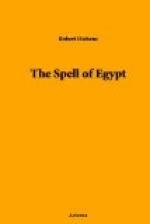The Ramesseum is a temple not of winds, but of soft and kindly airs. There comes Zephyrus, whispering love to Flora incarnate in the Lotus. To every sunbeam, to every little breeze, the ruins stretch out arms. They adore the deep-blue sky, the shining, sifted sand, untrammeled nature, all that whispers, “Freedom.”
So I felt that day when Ibrahim left me, so I feel always when I sit in the Ramesseum, that exultant victim of Time’s here not sacrilegious hand.
All strong souls cry out secretly for liberty as for a sacred necessity of life. Liberty seems to drench the Ramesseum. And all strong souls must exult there. The sun has taken it as a beloved possession. No massy walls keep him out. No shield-shaped battlements rear themselves up against the outer world as at Medinet-Abu. No huge pylons cast down upon the ground their forms in darkness. The stone glows with the sun, seems almost to have a soul glowing with the sense, the sun-ray sense, of freedom. The heart leaps up in the Ramesseum, not frivolously, but with a strange, sudden knowledge of the depths of passionate joy there are in life and in bountiful, glorious nature. Instead of the strength of a prison one feels the ecstasy of space; instead of the safety of inclosure, the rapture of naked publicity. But the public to whom this place of the great king is consigned is a public of Theban hills; of the sunbeams striking from them over the wide world toward the east; of light airs, of drifting sand grains, of singing birds, and of butterflies with pure white wings. If you have ever ridden an Arab horse, mounted in the heart of an oasis, to the verge of the great desert, you will remember the bound, thrilling with fiery animation, which he gives when he sets his feet on the sand beyond the last tall date-palms. A bound like that the soul gives when you sit in the Ramesseum, and see the crowding sunbeams, the far-off groves of palm-trees, and the drowsy mountains, like shadows, that sleep beyond the Nile. And you look up, perhaps, as I looked that morning, and upon a lotus column near you, relieved, you perceive the figure of a young man singing.




